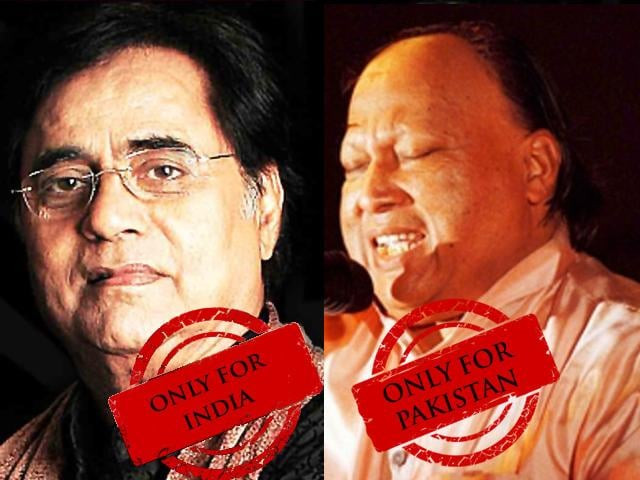Two decades later, the Siachen conflict grew to become one of the major factors for the Kargil war of 1999, in a parallel universe at around the same time, the Pakistani band Junoon was making the youth of India groove to the tunes of ‘sayonee’.
If talent and armed conflict could remain separate decades ago, today, when the online world is casting a wider web and borderless societies are being formed, one will not majorly affect the other. When Indian connoisseurs of qawwali sit down to download a collection, they would most likely type in “Ustad Nusrat Fateh Ali Khan” or “Sabri Brothers”, caring less about the nationality of the performers.
“Never thought of them as Pakistani talents till date,” said Vasudha Dalmia, a resident of Coimbatore, she was talking about talents like Rahet Fateh Ali Khan, Atif Aslam and Ali Zafar, “they are all super”. When a music lover listens to ‘laagi tumse mann ki lagan’, he is enthralled by the voice, the emotions, the melody and would not be bothered by the nationality of the singer.
For the world outside the subcontinent, Jagjit Singh and Ghulam Ali are both just fantastic ghazal singers.
“Oh, are they from different countries?” questioned Zahra Nadeem a resident of Eygpt, when asked to comment on the two singers.
Pakistan and India can never overlook the fact that they share a common history, which gave rise to a common culture, language and sensibilities.
People in Lucknow, Allahabad and Delhi would be mesmerised by Farida Khannum and Mehdi Hasan as much as people in Lahore would.
My friend Arun Siddalingappa once said,
“It’s art! There’s nothing political about art”.
Art is never apolitical.
When artists choose to perform in a rival country, they are making a political point. When audience throng the concerts of these artists, they are making a political point. And when the authorities try to stall performances, they are also making a political point. It is just time to recognise that there is a huge gap between the divisive politics of the authorities and inclusive politics of the audience.
Talent has been reasonably democratic (for those who can afford to do art for a living!), despite borders. I am sure Randhir Kapoor chose Zeba Bakhtiar to act in his 1982 film Heena because of her talent as an actor, not because India was lacking acting talent. Just as Vishal Bharadwaj decided to ask Rahat Fateh Ali Khan to sing the famed ‘dil to bachcha hai ji’ because it fit his voice quality and singing talent, not because singers are few in India.
Anand, who lives in Boston believes otherwise.
“Supporting Pakistani artists is like feeding our neighbour’s kids while our kids starve just because we want to be the most popular mom living in the street,” he says, “It doesn’t matter how well-behaved the neighbour’s kids may be, our kids come first! Simple!”
Question; why don’t organisers in India think twice about a Lady Gaga or a Beyonce performance that involves millions of dollars of revenue?
Let alone the fact that the US has committed war crimes against several countries, some would argue that the US has caused India more political hurdles in international forums, than Pakistan has caused in the neighbourhood.
Also, considering these pop singers have put our indie singers out of business?
Because when Lady Gaga performs in India, she is a pop singer first and a US citizen later. Similarly, when Atif Aslam sings, his country of origin becomes his secondary identity (at least to the audience that enjoys him).
Personally, I will be indebted to Mehdi Hasan’s 1985 album ‘Kehne Usse’ and Rahat Fateh Ali Khan’s 2006 solo ‘nainon ki mat suniyo’ for keeping me company over many a pensive, lonely night.
Read more by Raksha here or follow her on Twitter @Raksha_Kumar



COMMENTS
Comments are moderated and generally will be posted if they are on-topic and not abusive.
For more information, please see our Comments FAQ